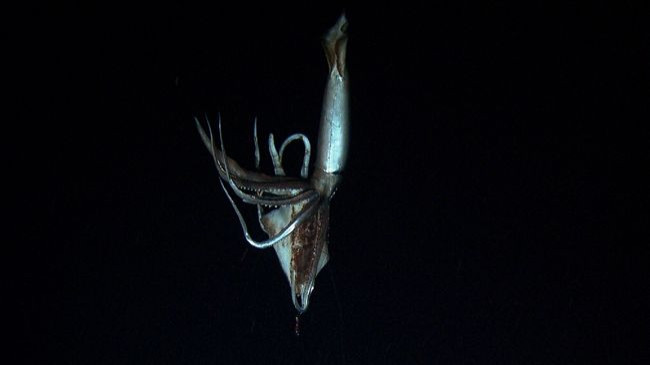
After over a decade of searching the seas, scientists say they've captured the first ever footage of a giant squid alive in its natural habitat, according to Phys.org.
Scientists filmed the 10-foot-long creature from a manned submersible nine miles east of Chichi Island in the North Pacific Ocean in a joint effort with Japan's National Museum of Nature and Science, Japanese public broadcaster NHK and the Discovery Channel. The footage will air in the U.S. Sunday, Jan. 27, as part of the Discovery Channel program "Monster Squid: The Giant Is Real."
A team of researchers encountered the squid, inexplicably missing its two longest tentacles, after about 100 missions, in which they logged 400 hours in a cramped submarine. Scientists followed the tremendous squid to a depth of almost 3,000 feet.
Scientists know very little about the giant squid. The mollusk's harsh environment makes it difficult for research to be conducted. While specimens of the animal have washed ashore dead before, researchers say they have never filmed the giant squid in its normal habitat deep in the ocean.
The giant squid was lured in by researchers with a three-foot-long diamond squid, appearing for the first time at a depth of about 2,100 feet. The squid wrapped its arms around the bait and ate for over 20 minutes before releasing its meal, researchers said.
"What we were able to gain from this experience was the moment of the giant squid attacking its prey - we were able record that," said Japanese zoologist Tsunemi Kubodera, who has studied the giant squid since 2002.
"It was shining and so beautiful," Kubodera told AFP. "I was so thrilled when I saw it first hand, but I was confident we would, because we rigorously researched the areas we might find it, based on past data."
Kubodera claims he filmed a live giant squid in 2006, but he was only able to do so after the animal was hooked and brought aboard his boat, he said.
According to NHK, the giant squid was captured using a high-definition camera that was developed specifically for the project. The special camera allowed the research team to operate at extreme ocean depths and used a special wavelength of light invisible to the giant squid's sensitive eyes.
Kubodera said this case should increase researchers' knowledge of deep-sea creatures moving forward. Having searched for the animal in the wild for over a decade he said meeting the giant squid felt serendipitous, even magical.
"It appeared only once, out of 100 dives. So perhaps, after over 10 years of some kind of relationship I've built with the giant squids, I feel, perhaps, it was the squid that came to see me," he said.
© 2025 Latin Times. All rights reserved. Do not reproduce without permission.




